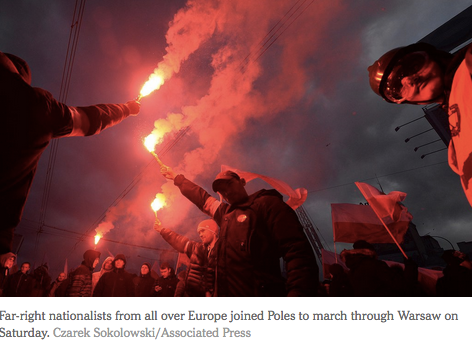It seemed like an echo of a more sinister time on Saturday, when 60,000 far-right nationalists from Poland and all over Europe marched through Warsaw with red flares and racist signs like “White Europe of brotherly nations” and “Clean Blood.”
Poland’s Foreign Ministry condemned racist, xenophobic and anti-Semitic remarks at the event, but the more salient point was the ministry’s defense of the demonstration as an outpouring of patriotism. The only people arrested were some pro-democracy counterprotesters.
Even more troubling for Americans, and perhaps for the world, was that the words from an old Polish nationalist song that were the march’s slogan — “We want God” — were cited by President Trump to huge applause on his visit to Warsaw in July.
Neo-fascist and white-supremacist groups have become more visible and assertive in Europe and the United States as a sense of alienation in a globalized world has taken hold, and as Middle Eastern and North African refugees have flooded Europe. But these extremists appear to feel energized and legitimized by nationalist and populist political leaders. Mr. Trump’s mild condemnation of the white-supremacist demonstration in Charlottesville, Va., in August — he said their ranks included some “very fine people” — could have only heartened the racists.




